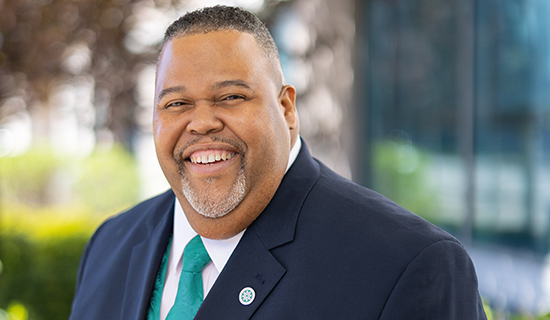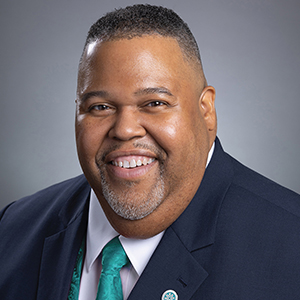Before Michael A. Baston, Ed.D., J.D., became the fifth president of Cuyahoga Community College (Tri-C) last year, he went undercover in Cleveland. He and his wife, Tasha, pretended to be evaluating Tri-C for their fictitious daughter, while secretly assessing whether the college community felt like home.
During his previous 20-year academic career in New York, most recently as president of Rockland Community College since 2017, Baston encountered Tri-C over the years through various national programs. He even visited the campus in 2015, while serving as vice president of student affairs and associate provost at LaGuardia Community College, to speak about ways that colleges and communities could collaborate to improve student outcomes.
“I was very impressed to see the innovative work of alignment that was happening here,” Baston says.
So, when Tri-C’s former president, Alex Johnson, announced his retirement, Baston decided to take a closer look at Cleveland. He and Tasha visited each campus and the surrounding communities, stopping at local grocery stores and restaurants along the way to get a feel for the region.
“If I could give any bit of insight to a person thinking about coming in to lead a major organization: Take some time before you start the job to get to know the community,” Baston says. “It was important for me to do my homework and make sure that not only did the institution think I was a fit for it, but that it was a fit for me and my family.”
The opportunities Baston saw in Tri-C and the community captured his attention, and the “Midwestern charm” and kindness they encountered along the way convinced them that Cleveland felt like home. Baston was named president of Tri-C, Ohio’s largest and oldest community college, on July 1, 2022.
Over his first 100 days in office, Baston met with more than 2,000 people through a series of 15 listening sessions with students, faculty, staff and community leaders. His team tediously taped, transcribed and analyzed these sessions to identify the common themes, which Baston then took back on the road to confirm their resonance within the community.
“When you come into a new organization, one of the best things you can do is listen to the people to understand the pain points and opportunities to get better,” Baston says. “Most people think of higher education as just an educational institution, but it is a business, and we are applying standard business practices to improve the experience and enhance the efficiencies of our institution.”
Here are the three themes Baston culled from this listening process, and how these informed his new vision for Tri-C as the college celebrates 60 years in business.
1. Building a culture of clarity
Since Tri-C opened in September 1963 to a crowd of 3,000 students eager to register for classes, the college has vastly expanded its academic offerings. Today, Tri-C offers more than 1,000 credit courses each semester across more than 200 career and technical programs, plus more than 600 noncredit workforce and professional development courses each year at four campuses and numerous off-campus sites throughout Cuyahoga County.
The first thing Baston learned from the listening sessions, however, was that people in the community weren’t aware of everything Tri-C offers.
“We’ve become very big, but not everybody understands what all we offer or how to navigate such a big system,” Baston says. “So, we’re going to concentrate on making it clearer.”
One of Baston’s main goals is to provide greater clarity — not only around the educational programs Tri-C offers, but also around the real-word job skills and opportunities these programs provide. Connecting these dots will be key to Tri-C’s growth, he says.
“To attract students, you have to clearly demonstrate the opportunity — not just the academic program, but the economic opportunities that are connected to the academic offering,” Baston says. “If we can better explain the economic opportunities, we will attract more students.”
To do this, Tri-C is launching new marketing campaigns and partnering with economic development organizations like Team NEO and the Greater Cleveland Partnership to raise awareness of these opportunities throughout the community.
2. Redesigning the student experience
As the largest community college in Ohio, Tri-C serves approximately 41,000 students in Cuyahoga County.
“We want to make sure that each of them has the kind of customized experience that enables them to be successful,” says Baston, a member of the American Association of Community Colleges (AACC) executive board and chair of its Audit and Finance Committee.
During the listening sessions, however, Baston realized that Tri-C’s enrollment process was cumbersome for students to navigate. To ensure ease of access to everyone, he set out to redesign the student experience, starting with enrollment. He brought together key stakeholders involved in enrollment, and engaged Lean Six Sigma experts from Tri-C’s Corporate College to methodically streamline the process.
“We did a Lean Kaizen event to move from 111 steps in the enrollment process to 35, from 60 different kinds of technology that students interface with down to 30,” Baston says. “What we’re trying to do is simplify the process. Getting people on the same page to address the problem and solve it together was truly a game-changer.”
To reduce the number of steps involved in enrollment, for example, administrators created checklists of items for students to bring to the first visit, eliminating the need for return trips. They’re also trying to start the career exploration process with students even earlier to personalize academic tracks upfront, instead of waiting until graduation time to plan next steps.
“We’re asking students what their life goals and career aspirations are before they meet with a counselor to register for class and intentionally hardwiring in educational experiences,” he says, “so when they leave, they’re what I call ‘opportunity ready.’ They will have had the experiential learning that makes them more marketable for post-graduate success.”
3. Strengthening the value proposition
As job markets and workplace environments continue to shift rapidly in the wake of the pandemic, Baston realized that Tri-C’s value proposition had to evolve, as well.
“Today, young people are making different choices about what to do with their lives,” says Baston, who serves as co-chair of Jobs for the Future’s Policy Leadership Trust. “We see a lot of young folks going into the freelance or gig economy versus going into higher education. If we can strengthen our value proposition, we can give those gig workers the entrepreneurial skills so their business can thrive. We’re not just creating workers; we want to create opportunities for students to have a choice as to whether they’re going to be employees or employers.”
To stay relevant in the post-pandemic “now normal,” as Baston called it in his first column for Smart Business last October, Tri-C is meeting students where they are by offering online classes in addition to traditional learning experiences.
“Prior to the pandemic, about 18 percent of our students were fully online. Currently, we’re at about 50 percent,” he says. “That means that our modalities have to change so students can take courses that are more convenient; that has to be part of the way we architect our business and our schedule. We’re much more flexible, agile, resilient and forward-thinking because we’ve been pushed to do that.”
Partnering with local employers
Preparing students for the future is only part of Tri-C’s focus. The college is simultaneously strengthening its value proposition to employers throughout the community — not only providing “opportunity-ready” graduates equipped with real-world skills, but also providing workforce development courses and ongoing training to help local companies upskill their current employees, too.
“Your workforce may need to be upskilled or retrained, and you may not have the bandwidth to do that,” Baston says. “We become your educational partner to expand your capacity to develop your talent. Then, employees coming in knowing there’s a ladder to move up in the organization, that there are supports that enable them to build a career. We, in the community college space, can add that value.”
For example, Tri-C partners with the Greater Cleveland Regional Transit Authority to train RTA bus drivers at Tri-C Euclid’s Transportation Innovation Center. The college also partners with organizations like Swagelok, Cleveland-Cliffs Inc. and MetroHealth to provide job-specific training.
“The employees get a quality education, and the employers get well-prepared workers,” Baston says. “It’s a win-win partnership.”
Upskilling is a critical piece of talent retention, which Baston calls “one of the greatest issues facing businesses in this community.” Considering that 85 percent of Tri-C students stay in the region after graduating, and 75 percent attend classes part-time while working, Baston sees a strong connection between his student body and Northeast Ohio’s future workforce.
“Our purpose as a community college is to strengthen the viability of our community,” Baston says, “giving people the best possible opportunity to live, work and grow right here.”
Making an impact
These three themes are key to Baston’s vision as Tri-C evolves to meet the shifting needs of students and employers. However, he knows the college can’t achieve this vision alone. He urges local businesses to rethink their approach to recruiting and retaining talent by redefining their expectations.
“We have felt for too long in this country that educational credentials, like the baccalaureate degree, should be the gateway credential,” Baston says. “Because of that, businesses have lost out on talented and skilled people who didn’t have that gateway credential. I would encourage businesses to focus more on the skills, and work with places like Tri-C to get the credentials so we’re not losing access to wonderfully talented people because we’re emphasizing the completion of a degree. If we’re not prioritizing skills, we’re leaving stranded assets.”
By clarifying the offerings and opportunities at Tri-C, redesigning the student experience and refreshing the institution’s value proposition throughout the community, Baston is working to connect more students with the skills to succeed in today’s workforce. As the college celebrates its 60th anniversary this year, Baston strives to carry on Tri-C’s legacy of excellence as he guides the college into the future.
“Our north star is to ensure that it’s not just access, it’s not just completion, but it’s about the post-completion outcomes of our students,” he says. “Those outcomes start here, because this is where futures begin.” ●
TAKEAWAYS
- Clearly communicate the opportunities your organization offers.
- Look for ways to simplify and streamline processes.
- Keep your value proposition relevant as trends shift.



